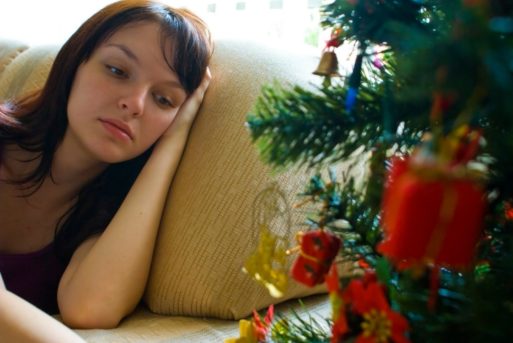Although it may be hard to believe, the Holiday Season is upon us again. The shopping malls are bustling with activity, the streets are glowing with holiday lights, and celebrations and family gatherings abound. For many of us, this is a joyous time — an opportunity to express our love and appreciation for friends and family and share a sense of community we don’t necessarily experience during the rest of the year. But for many others, it’s a time of loneliness, isolation, and a pervasive feeling of sadness that psychologists call the “Holiday Blues.”

Feelings of sadness and isolation are not uncommon around the holidays
Feelings of sadness, loneliness, and disconnection from the festivities that accompany the holidays are not uncommon. Especially today, when the spirit of giving is imbued with so much commercialism, and the pressure to come up with “the perfect gift” haunts us all, many people suffer occasionally from stress or anxiety at this time of year. But holiday stress can become debilitating when other factors, such as pre-existing mental health issues or a recent (or not-so-recent) loss cause a person to feel overwhelmed.
“If there has been a loss in the family, whether it’s a death or the first year going through a divorce, the holidays are always extra hurtful and sad,” said Elaine Rodino, a psychologist from State College, Pennsylvania, in an interview with Time. “People don’t know how to get through it, how much they should do [to celebrate the holidays]. It’s difficult,” she added.
Overly high expectations are another reason for holiday depression. Even when the holidays have been disappointing or fraught with drama in the past, many people hold out hope that this year’s family gatherings will be happy events. “I have clients who want this concept of a Norman Rockwell family,” said Dr. Rosalind Dorlen, a clinical psychologist from Summit New Jersey. “[But] it’s hard to find those real Norman Rockwell families. People have them, but they’re in paintings,” she said.
Other culprits include time constraints, holiday shopping and the financial pressure of buying gifts. According to Principal Financial Group’s annual poll of American workers in 2017, 52 percent of those asked said that holiday gift-giving would create a moderate amount of stress for them and their families, while 8 percent said it would cause a great deal of stress. The good news: Both of these numbers declined somewhat between 2015 and 2017, when they were 53 percent and 11 percent respectively.
Seasonal Affective Disorder
Another factor that may contribute to holiday depression is Seasonal Affective Disorder or SAD. As the name implies, SAD is a collection of symptoms that typically occur at the same time of year — most often during the late fall and winter months, though they can happen in the spring and summer too. Those affected by winter-onset SAD usually have symptoms such as:
- Feeling sad most of the time
- Lack of energy
- Loss of interest in once-pleasurable activities
- Sleep disturbances, especially oversleeping
- Changes in appetite, especially cravings for high-carbohydrate foods
- Weight gain
- Feelings of hopelessness
- Suicidal thoughts
Although experts are not sure what causes SAD, they theorize that lower levels of light and shorter days in the winter months disrupt the body’s “internal clock” (circadian rhythm). Changes in the levels of the neurotransmitters serotonin and melatonin, which have an effect on both mood and sleep, may also contribute to the symptoms of SAD.
Treatment for SAD is, fortunately, fairly simple. Most sufferers respond well to phototherapy, which involves sitting in front of a special light box shortly after waking up each day. The light from these boxes mimics natural sunlight and is often enough to “reset” the afflicted person’s mood. Antidepressants and/or psychotherapy can also help.
Handling the Holiday Blues
While the Holiday Blues are usually transient, the symptoms can be very unsettling. Experts recommend a number of strategies for dealing with these, perhaps the most important of which is acknowledging your feelings and not trying to put on a happy face all the time. This is especially true if you are dealing with the loss of a loved one or the holidays mark the anniversary of a significant loss. It’s also important to seek out community, whether through friends or family, a support group or religious events. Being around others won’t take your sadness away, but it can help you to feel less alone.
Remember, too, that you don’t have to give in to the pressures of commercialism. Set a budget for your holiday spending, and don’t buy gifts you can’t afford. And set limits on the amount of time you devote to holiday festivities as well. It’s OK to say “No” if you’re feeling tired or stressed; the people who truly care for you will understand.
Lastly, if you’re feeling hopelessly sad and these feelings become overwhelming, please reach out for help. Although it’s not true that suicides spike around the holidays, persistent depression can put you at risk. So don’t try to manage your feelings on your own. Contact your physician or a mental health professional, or call the National Suicide Prevention Lifeline 1-800-273-8255 any time day or night, seven days a week for support.

 Why Do Some People Suffer From the “Holiday Blues”?
Why Do Some People Suffer From the “Holiday Blues”?




 How to Comfort A Dying Loved One
How to Comfort A Dying Loved One
 Our Annual Seven Holiday Gifts for Someone Who Is Grieving, 2024 Edition
Our Annual Seven Holiday Gifts for Someone Who Is Grieving, 2024 Edition














